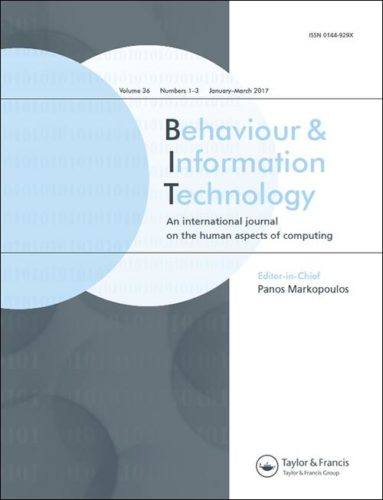 The growing importance of social media in conflicts and crises is accompanied by an ever-increasing research interest in the field of crisis informatics in order to identify potential benefits and develop measures against the technology’s abuse. To address this, Prof. Christian Reuter, Technische Universität Darmstadt, Prof. Stefan Stieglitz, University of Duisburg-Essen, and Dr. Muhammad Imran, Qatar Computing Research Institute, published a special issue in Behaviour & Information Technology (BIT) – an international journal on the human aspects of computing. This journal is ranked as „A“ according to CORE Ranking.
The growing importance of social media in conflicts and crises is accompanied by an ever-increasing research interest in the field of crisis informatics in order to identify potential benefits and develop measures against the technology’s abuse. To address this, Prof. Christian Reuter, Technische Universität Darmstadt, Prof. Stefan Stieglitz, University of Duisburg-Essen, and Dr. Muhammad Imran, Qatar Computing Research Institute, published a special issue in Behaviour & Information Technology (BIT) – an international journal on the human aspects of computing. This journal is ranked as „A“ according to CORE Ranking.
The special issue sets out to give an overview of current research on the use of social media in conflicts and crises. In doing so, it focuses on both good and malicious aspects of social media and includes a variety of contributions of conceptual, theoretical and empirical nature. The special issue presents an overview of the field, analytical methods, technical challenges, current advancements and the accepted papers.
The editors received 17 submissions for the special issue which address some of the open issues. After two rounds of rigorous reviewing, six articles were accepted for publication.
- Editorial Social Media in conflicts and crises by Christian Reuter, Stefan Stieglitz and Imran Muhammad
- Breaking’ News: Uncovering Sense-Breaking Patterns in Social Media Crisis Communication during the 2017 Manchester Bombing by Milad Mirbabaie and Julian Marx (University of Duisburg-Essen)
- Use of Twitter in the Cameroon Anglophone Crisis by Julius Tanyu Nganji and Lynn Cockburn (University of Toronto)
- Descriptive and Visual Summaries of Disaster Events using Artificial Intelligence Techniques: Case Studies of Hurricanes Harvey, Irma, and Maria by Firoj Alam, Ferda Ofli and Muhammad Imran (Qatar Computing Research Institute)
- Mitigating Information Overload in Social Media during Conflicts and Crises: Design and Evaluation of a Cross-Platform Alerting System by Marc-André Kaufhold, Nicola Rupp, Christian Reuter and Matthias Habdank (Technische Universität Darmstadt, Universität Siegen and Universität Paderborn)
- Repertoires of Collaboration: Incorporation of Social Media Help Requests into the Common Operating Picture by Christian Ehnis and Deborah Bunker (The University of Sydney)
- A conceptual framework for developing solutions that organize social media information for the emergency response team by Danilo P. Freitas, Marcos R. S. Borges and Paulo Victor R. Carvalho (Universidade Federal do Rio de Janeiro)
While Mirbabaie and Marx focus on the deployment of social media during crises as a real-time broadcasting medium, Nganji and Cockburn observe that social media has increased the scope of public narratives and lessened the government’s grip on media regarding Cameroon’s Anglophone Crisis. Alam, Ofli and Imran in turn examine techniques to enhance situational awareness for disaster response personnel, whereas Kaufhold, Rupp, Reuter and Habdank contend that new techniques are necessary to prevent emergency services from suffering information overload and a decrease in information quality. Ehnis and Bunker examine Australian emergency services’ command and control and argue for the incorporation of social media in decision-making processes to increase situational awareness. The last paper, written by Freitas, Borges and Carvalho, addresses the possible use of social media messages for direct rescue missions during emergencies and presents a framework to better utilize data in that regard.
The editors would like to thank the editor-in-chief of BIT, Prof. Panos Markopoulos, for giving the opportunity to edit this special issue and all of the reviewers for their contributions to make this special issue possible.
Prof. Christian Reuter, is Professor for Science and Technology for Peace and Security (PEASEC) at the Department of Computer Science with a secondary appointment in the Department History and Social Sciences at Technische Universität Darmstadt. In his research, he focuses on the design of interactive and collaborative technologies in the context of crises, security, safety and peace. He has published around 175 scientific articles on Computer Science, Information Systems, Human-Computer Interaction, Computer-Supported Collaborative Work, Crisis-, Security-, Safety- and Peace-Research as well as Social Media.
Prof. Stefan Stieglitz, is professor and head of the research group for Professional Communication in Electronic Media / Social Media at the University of Duisburg-Essen, Germany. In his research, he investigates patterns of social media communication and application domains for social media analytics. Moreover, he studies user behavior and technology adaption of collaborative information systems in organizational contexts. His work has been published in reputable journals such as Journal of Management Information Systems, European Journal of Information Systems, Information Systems Frontiers, International Journal of Information Management and Business & Information Systems Engineering. In 2016 one of his articles was recognized with the ‘AIS Senior Scholars Best IS Publications Award’.
Dr. Muhammad Imran, is a research scientist and leader of the Crisis Computing team at Qatar Computing Research Institute (QCRI). His interdisciplinary research focuses on natural language processing, text mining, human-computer interaction, applied machine learning and stream processing areas. He analyzes social media communications during time-critical situations using big data analysis techniques such as data mining, machine learning and deep neural networks. He develops novel computational models, techniques and technologies useful for stakeholders to gain situational awareness and actionable information for emergency response. He has published over 70 research papers in top-tier international conferences and journals including ACL, SIGIR, IJHCI, ICWSM and WWW. Two of his papers received the „Best Paper Award.“
